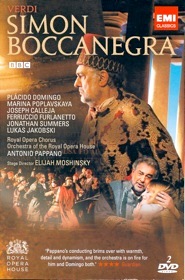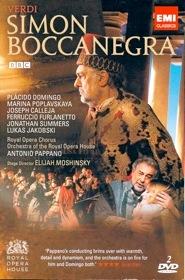
In tribute to tenor Plácido Domingo in his 70th birthday year, both EMI and Sony have released DVDs of his first foray into the baritone repertoire, the lead in Verdi’s opera Simon Boccanegra. The performances took place last year, Sony’s at the Metropolitan Opera (simultaneously broadcast live in HD) with James Levine conducting, and EMI’s at the Royal Opera House Covent Garden with Antonio Pappano in charge. As powerful as was Domingo’s Met performance of Feb. 6, 2010, the superior cast and production at Covent Garden, recorded five months later, make it the DVD to own.
Surrounding Domingo’s Boccanegra are the exquisitely sung Amelia (Boccanegra’s daughter) of soprano Marina Poplavskaya, the beautifully voiced Gabriele Adorno (her lover) of tenor Joseph Calleja, the towering Jacopo Fiesco (one of Boccanegra’s enemies) of bass Ferruccio Furlanetto, and the ever-scheming Paolo Albiani (Boccanegra’s supporter turned assassin) of Jonathan Summers. Taken as a whole, this is one of the finer Verdi casts a house can assemble in this era.
Domingo is a marvel. Filmed over the course of three performances, to ensure that every scene catches him at his finest, he sings with sterling tone and utmost generosity of spirit. Absolutely steady of voice, he sounds each phrase like a master, living and feeling each of the intense emotions that make for riveting Verdi.
Because the role lies lower in Domingo’s voice, in a region unaffected by age, he is able to apply maximum pressure and still produce the burnished tones of his prime. As emphatic as the portrayal may be, everything is sung, without resort to shouting or coarseness. Concerns over whether his tenor timbre is suitable for baritone assumptions fade in the face of a portrayal of such vibrancy as to make baritone Dmitri Hvorostovsky’s recent Boccanegra in San Francisco seem wooden by comparison.
Poplavskaya may look far more Russian than Italian, but her voice is as lovely as her long blonde tresses, and her portrayal is touching. The singing is not perfect, and she works hard at times, but the high C in her big aria, “Come in quest’ora bruna,” is gorgeous.
Calleja, now only 33, has developed into one of our finer tenors. While his warm timbre and sweetness on top make him ideal for lighter Italian roles, he also has sufficient power and thrust for Verdi. Veteran bass Furlanetto may not be able to summon up much color these days, but his dark instrument remains fairly steady, and is far more inviting than the voice of the Met’s prone-to-bark James Morris. The vibrato of another veteran, Summers, may wobble a bit, yet his Paolo is as despicable as Verdi must have wished.
Thanks to John Harrison’s brilliant and colorful lighting, each of Michael Yeargan’s palatial sets looks like a chiaroscuro painting by a Renaissance master. Pappano’s conducting rivals Levine’s — listen to how poetic the orchestra sounds, and how transparent the strings are before Amelia’s aria — and his brief spoken introductions to each act help focus the viewer’s attention. Director Elijah Moshinsky deserves copious credit for fusing acting and singing in such a convincing manner. While it’s ridiculous that EMI omits chapter titles from its booklet, that won’t stop anyone wishing to enjoy Domingo at his born-again baritonal peak.

